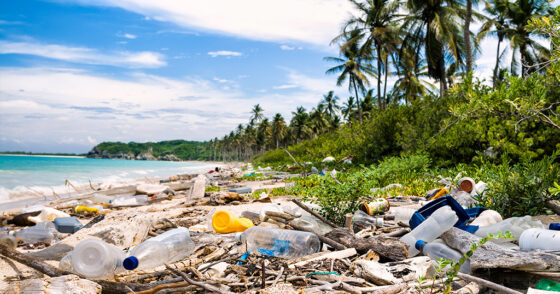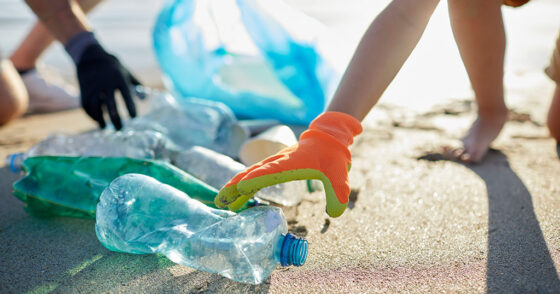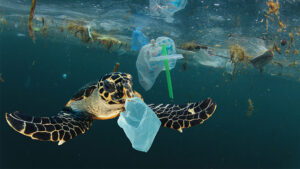Another year around the sun. Earth Day 2024 is on 22 April, and awareness and participation has never been more vital.
The importance of Earth Day, and the real-world effects it has, can’t be overstated. The world is at a severe tipping point in terms of environmental degradation and only swift and collective action will avert what will essentially be a global catastrophe. Yes, it’s really that bad.
But we can do it if we all intentionally join in action.
The theme this year is Planet vs. Plastics. So, what does that mean, what events and actions will be taking place, and more importantly, what can small businesses do to pitch in and save your own planet?

Why is this year’s theme ‘Planet vs Plastics’?
The goal of this year and beyond will be to radically reduce the production and consumption of plastics across the globe.
In fact, the stated intention is that:
“Planet vs. Plastics unites students, parents, businesses, governments, churches, unions, individuals, and NGOs in an unwavering commitment to call for the end of plastics for the sake of human and planetary health, demanding a 60% reduction in the production of plastics by 2040 and an ultimate goal of building a plastic-free future for generations to come.”
Clearly recycling is not enough. To achieve a 60% reduction in the production of plastics by 2040, the individual goals are as follows:
- Promote widespread public awareness of the damage done by plastic to human, animal, and all biodiversity’s health, and demand more research on its health implications.
- Rapidly phase out all single use plastics by 2030.
- Demand policies end the scourge of fast fashion and the vast amount of plastic it produces and uses.
- Invest in innovative technologies and materials to build a plastic-free world.
Some lofty and important intentions to be sure, but entirely achievable with some elbow grease and simple adjustments.

6 Realistic ways you can pitch in and make a difference
Let’s get down to the nitty gritty of realistic and concrete ways you can change the way you work to do your part…
1) Eliminate single use plastics altogether
There’s almost no excuse not to be able to eliminate, or practically eliminate, all single use plastics from your business practices, products, and services. Come on guys, let’s get it together.
In 2024, there are so many excellent and affordable alternatives for things like plastic packaging, cups, office supplies, and bags. Not only can you find materials like sustainable bamboo, but you can encourage or necessitate repeat-use items in your business (think reusable and BYO).
Don’t be lazy. Get on it now.
2) Really interrogate your supply chains
Take a good hard look at your suppliers. You should not only look at how you can replace plastics, but you should check in on your suppliers to ensure they’re doing their part.
If they aren’t, ask if they have better ways of doing business or simply vote with your cash and your feet.
It’s time to ditch negligent suppliers and supply chains instead of blindly feeding the beast with fistfuls of cash. They’ll soon get the picture.
3) Partner up effectively and gather resources
There are a wide range of not-for-profits (NFPs) you can partner up with to combat plastic pollution and a variety of other environmental assaults. They often have networks, resources, and recommendations that can genuinely assist.
- Download the Action Toolkit from Earth Day.
- Check out Clean hub who help make your brand eco-friendly.
- Sign up to the Global Plastics Treaty.
- Get business resources like footprint accounting from rePurpose.
- Get certified as plastic neutral with Waste Revolution.
- Join the Boomerang Alliance to stay informed.
- Look into organisations like Torress Webb, who are forming partnerships with indigenous groups to end plastic waste.
There are so many organisations and nonprofits out there that you can link up with to receive knowledge, access tools, and make better choices. Go find them!
4) Take physical action in your area to reduce pollution
Time to get physical!
First ask yourself, “Am I part of the problem? Am I a tosser?” If you are, far out Brussels sprout, pull yourself together and immediately cease your lethargic litterbug lifestyle.
Now, be part of the solution. Make it a regular part of your year to take time out with employees, family, and friends to get out there and clean up plastic waste.
It’s time for simple and direct action.
Heck, make it a mainstay of your personality to pick up the rubbish you come across in your daily existence.
To get more organised about it, join events like Clean Up Australia Day or the Great Global Cleanup. You can organise your own event too and register it with these organisations be even more proactive.
A great result of this is the psychological aspect to seeing people “emu pick” trash. Onlookers and passersby get inspired too, and the goodwill spreads.
5) Invest in quality long-term goods from sustainable companies
Reward companies with active environmental credentials by purchasing long term and high-quality goods, equipment, and tools from them. (Beware of cynical, marketing-led greenwashing, though).
This can mean a few things. One is that you won’t be dumping crappy broken goods in landfill on a regular basis. Another is that you’ll have decent equipment to perform your duties to a high standard, for long periods of time.
This goes for clothing, too. ‘Fast fashion’ is a serious scourge and major contributor to issues like microplastic accumulation. Invest in good quality pieces that will last – you’ll look better anyway.
Ditch the tacky garbage threads, people.
6) Re-evaluate your superannuation and investments
There’s been a big push in recent years to really place a premium on green and ethical superannuation funds and investment portfolios.
This is a meaningful way of being part of larger change by voting with your money and helping to grow investments that are predicated on businesses and holdings with a clear environmental and sustainability focus.
Green and ethical super funds, for example, aim to invest people’s superannuation in companies and funds which prioritise environmental and human rights concerns.
Have a look at your super and investments to see if you can reap the same monetary rewards through a more conscious allocation of funds.
While there’s no gold standard yet for what is termed ‘ethical super’, by opening your eyes to the specifics of your super investment spread, you can see a lot… And then do something about it.

Leave a Reply